African Adventure – Overlanding in East Africa
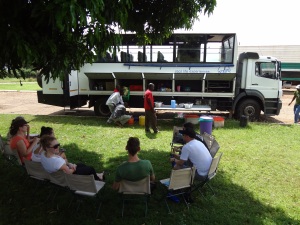
In 2010, while backpacking in Vietnam, we met a couple who was at the end of their one-year world trip. They mentioned that the favorite part of their journey was overlanding in Africa. Inspired by that, we decided to find out more about it. Overlanding trip can take different forms but it typically means an organized tour in a big truck where you camp in tents and share duties like cooking, washing dishes and cleaning. After a little bit of research, we concluded that overlanding was probably the best and most economical way to travel around Africa. It was much easier that renting a vehicle and hiring guides for every activity involved – let alone figuring out where it’s safe to visit or eat etc. Since you cook your own food (or your cook does), you save on meals. Overlanding packs a lot of activities in a short period of time – much more than what anybody can manage on their own. There are typically optional activities available at extra cost providing some flexibility. So if you don’t mind roughing it out a little, then this mode of travel is the most value for your money – especially in Africa.
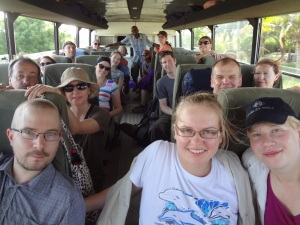
As usual, visas being our main constraint, we chose to go to four countries in East Africa – Kenya, Uganda, Rwanda and Tanzania – and found a company that offered a month through all four. This was our first time travelling with a group, a guide and a schedule on this trip. It felt quite alien at first. We didn’t have to research anything, ask for directions or decide what to do and where to eat. Every night our tour leader told us what the plan was and when we needed to get up. Easy! We were only responsible for pitching our tent, personal hygiene and purchasing enough alcohol to last us in the wilderness.
Intrepid
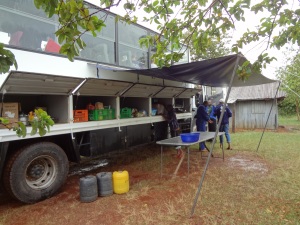
The company we chose to go with is called Intrepid and the specific tour – Gorillas, Game Parks and Beaches. The trip itself was divided into two parts – (1) Nairobi to Uganda to Rwanda and back to Nairobi and then (2) from Nairobi south through mainland Tanzania to Zanzibar. We had two different groups of fellow travelers for the two parts. For the first stretch it was 11 of us and for the second – 18. We really enjoyed travelling with Intrepid and had a great team – our tour leader, Julius, was very friendly and knowledgeable and became a good friend; our cook, Kababa, made food that was too good to resists going for seconds (which added a few inches to both our waistlines); and several different drivers, who hanged out with us and played soccer with Ajit.
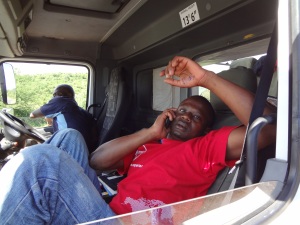
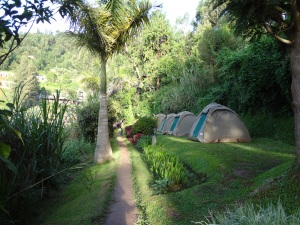
So far on the trip, we hadn’t done any camping. Tents and mats were provided by Intrepid and they were super comfortable. However, putting up a tent every night and bringing it down at five o’clock in the morning gets old very quickly. Most of the time, we were at campgrounds with running water and flushing toilets, only once or twice the toilet was just a hole on top of a big hole in the ground, but this is precisely the excitement we were looking for. In most of the national parks, we were likely to meet wild life if going to the toilet at night – African buffaloes, hippopotami, warthogs, antelopes, hyenas and other creatures – so holding it until the morning was recommended or alternatively peeing right outside the tent to mark your territory . Of course, finding internet connection was as probable as finding gold.
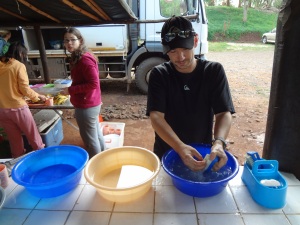
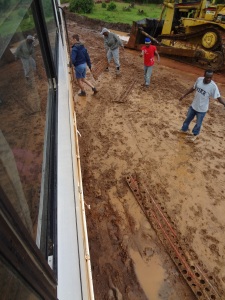
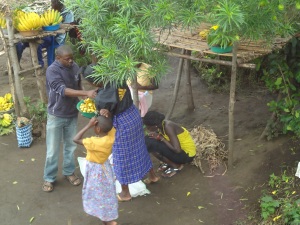
Cost
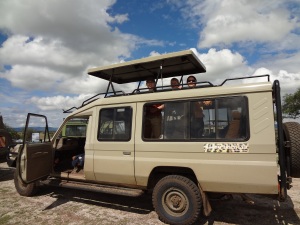
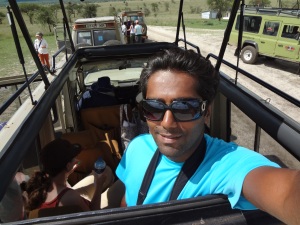
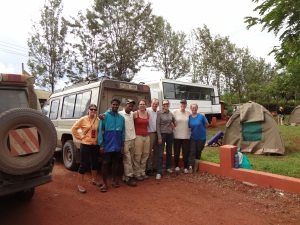
East Africa was the most expensive place we have been to, partly because we did a safari and partly because everything available to tourists in the region is extremely expensive. Just for a quick comparison: we enjoyed a balloon ride in Egypt for 40 USD per person, the same ride cost 150 USD in Turkey and a whopping 500 USD in Serengeti, Tanzania. The same ratio applied to most other activities on offer. Ajit and I have many speculations about what may be the cause of the high prices in East Africa, but nobody could answer that question for us with any certainty. It may be that such things as running water, electricity and other Western commodities are often unavailable to local people and providing these for tourists is inefficient and difficult. It may be that the things we pay for as tourists, for example Head and Shoulders shampoo, are only sold to foreigners, who are willing to pay anything for them and wouldn’t be able to substitute with local products. Also, delivering Western products to places such as Rwanda and Uganda, which are landlocked countries, means crossing thousands of kilometers from the nearest port in Kenya on bad roads, unreliable vehicles, expensive petrol and through corrupt border officials. Another aspect of the cost of travel in East Africa was that the places of interest to tourists are mainly national parks. The entry fees for those are set by some greedy government officials and the fees are often a big part of the country’s GDP. In the case of Rwanda, gorilla permits are the largest source of export revenue and each permit currently costs 750 USD per person. Also, you can’t take a free walking tour amid the wildlife in Serengeti – you need to hire a 4×4 vehicle with a special authorized driver, which costs something in the neighborhood of 400 USD per day per vehicle. We could only speculate about the reasons mentioned so far, but the bottom line is this was the most expensive part of our trip. And we loved every minute of it. All in all, we spent an average of 150 USD per person per day for the safari, which included food, accommodation, transport, guides and activities and about 8 to 10 USD per person per day for personal expenses, such as a tiny bit of internet, lots of alcohol, some chocolate, fancy coffee and other optional luxuries.
What We Saw
Keep an eye out for the next few posts about our experiences in Kenya, Uganda, Rwanda and Tanzania…
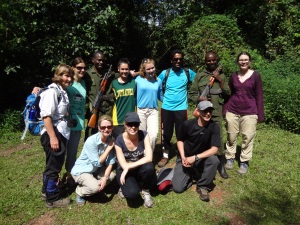
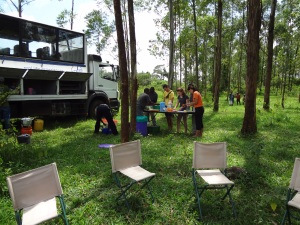
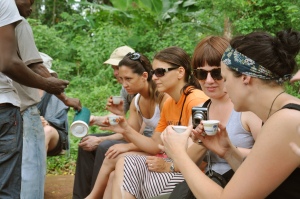

Hi Ajit,
I was checking out your blog to see where you are after watching the events in Watertown and Boston this week. Hope you and Mariya are well and hope to see you sometime in Boston to catch up when you return.
All the best,
Kenneth Parsons